Entrepreneurship and Small Business Impact
VerifiedAdded on 2020/10/22
|12
|4466
|186
AI Summary
The provided document is an assignment that focuses on the importance of entrepreneurship and small business in the UK economy. The report highlights the significant contributions made by micro and small businesses to the country's GDP, job creation, and economic growth. Additionally, it discusses the impact of Brexit on these businesses, including potential challenges and opportunities. The assignment provides a comprehensive overview of the role of entrepreneurship and small business in the UK economy, making it a valuable resource for students and researchers.
Contribute Materials
Your contribution can guide someone’s learning journey. Share your
documents today.

Entrepreneurship and Small Business Management
Secure Best Marks with AI Grader
Need help grading? Try our AI Grader for instant feedback on your assignments.
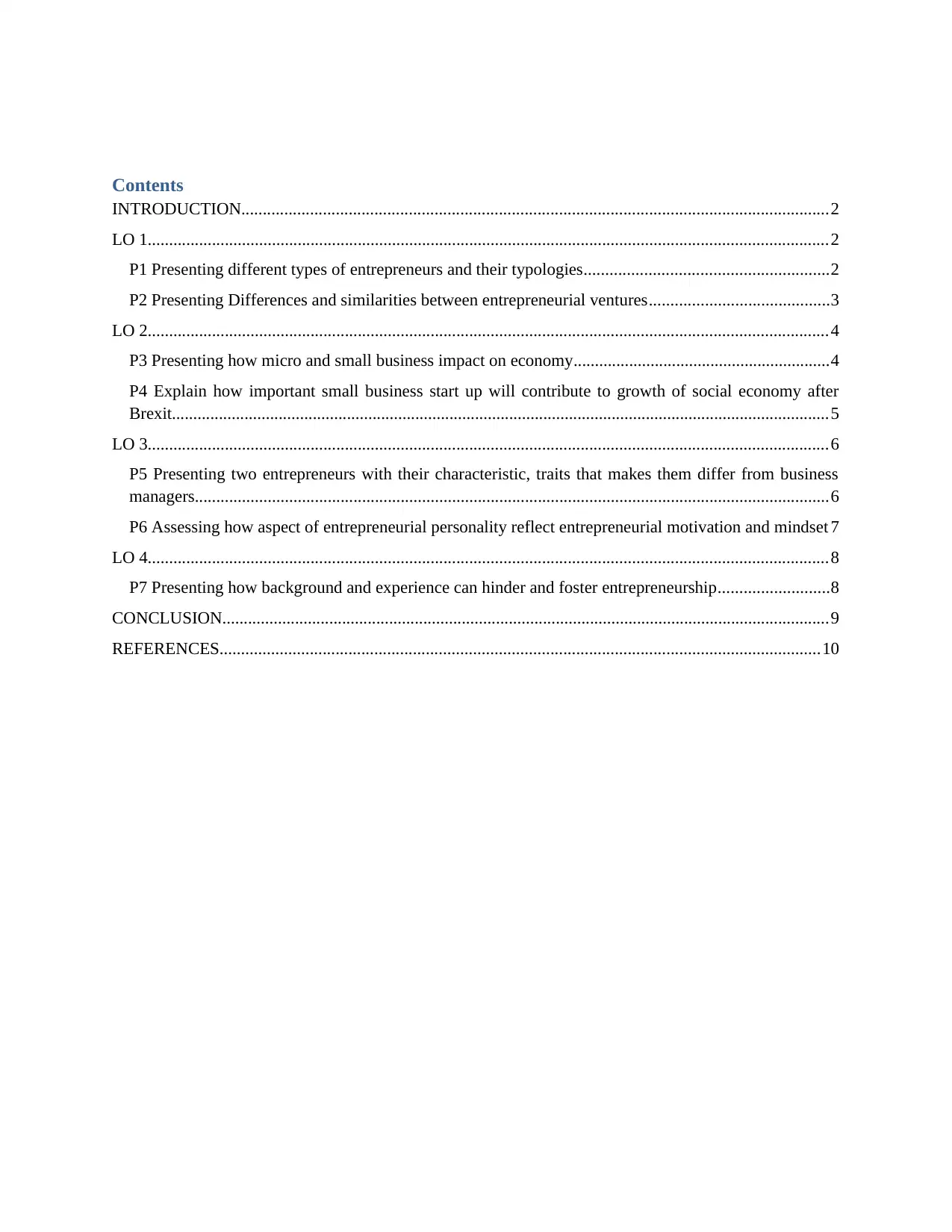
Contents
INTRODUCTION.........................................................................................................................................2
LO 1...............................................................................................................................................................2
P1 Presenting different types of entrepreneurs and their typologies.........................................................2
P2 Presenting Differences and similarities between entrepreneurial ventures..........................................3
LO 2...............................................................................................................................................................4
P3 Presenting how micro and small business impact on economy............................................................4
P4 Explain how important small business start up will contribute to growth of social economy after
Brexit..........................................................................................................................................................5
LO 3...............................................................................................................................................................6
P5 Presenting two entrepreneurs with their characteristic, traits that makes them differ from business
managers....................................................................................................................................................6
P6 Assessing how aspect of entrepreneurial personality reflect entrepreneurial motivation and mindset 7
LO 4...............................................................................................................................................................8
P7 Presenting how background and experience can hinder and foster entrepreneurship..........................8
CONCLUSION..............................................................................................................................................9
REFERENCES............................................................................................................................................10
INTRODUCTION.........................................................................................................................................2
LO 1...............................................................................................................................................................2
P1 Presenting different types of entrepreneurs and their typologies.........................................................2
P2 Presenting Differences and similarities between entrepreneurial ventures..........................................3
LO 2...............................................................................................................................................................4
P3 Presenting how micro and small business impact on economy............................................................4
P4 Explain how important small business start up will contribute to growth of social economy after
Brexit..........................................................................................................................................................5
LO 3...............................................................................................................................................................6
P5 Presenting two entrepreneurs with their characteristic, traits that makes them differ from business
managers....................................................................................................................................................6
P6 Assessing how aspect of entrepreneurial personality reflect entrepreneurial motivation and mindset 7
LO 4...............................................................................................................................................................8
P7 Presenting how background and experience can hinder and foster entrepreneurship..........................8
CONCLUSION..............................................................................................................................................9
REFERENCES............................................................................................................................................10
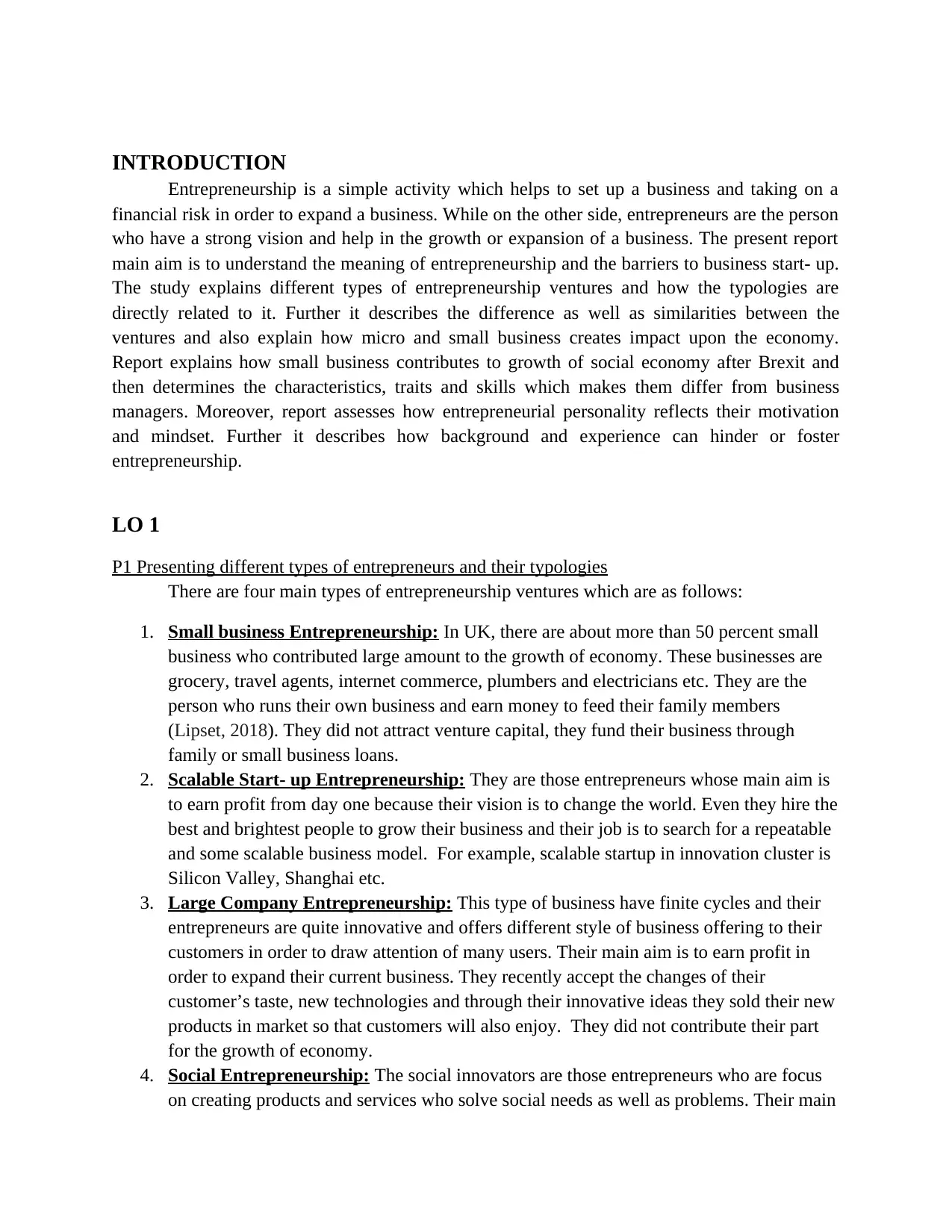
INTRODUCTION
Entrepreneurship is a simple activity which helps to set up a business and taking on a
financial risk in order to expand a business. While on the other side, entrepreneurs are the person
who have a strong vision and help in the growth or expansion of a business. The present report
main aim is to understand the meaning of entrepreneurship and the barriers to business start- up.
The study explains different types of entrepreneurship ventures and how the typologies are
directly related to it. Further it describes the difference as well as similarities between the
ventures and also explain how micro and small business creates impact upon the economy.
Report explains how small business contributes to growth of social economy after Brexit and
then determines the characteristics, traits and skills which makes them differ from business
managers. Moreover, report assesses how entrepreneurial personality reflects their motivation
and mindset. Further it describes how background and experience can hinder or foster
entrepreneurship.
LO 1
P1 Presenting different types of entrepreneurs and their typologies
There are four main types of entrepreneurship ventures which are as follows:
1. Small business Entrepreneurship: In UK, there are about more than 50 percent small
business who contributed large amount to the growth of economy. These businesses are
grocery, travel agents, internet commerce, plumbers and electricians etc. They are the
person who runs their own business and earn money to feed their family members
(Lipset, 2018). They did not attract venture capital, they fund their business through
family or small business loans.
2. Scalable Start- up Entrepreneurship: They are those entrepreneurs whose main aim is
to earn profit from day one because their vision is to change the world. Even they hire the
best and brightest people to grow their business and their job is to search for a repeatable
and some scalable business model. For example, scalable startup in innovation cluster is
Silicon Valley, Shanghai etc.
3. Large Company Entrepreneurship: This type of business have finite cycles and their
entrepreneurs are quite innovative and offers different style of business offering to their
customers in order to draw attention of many users. Their main aim is to earn profit in
order to expand their current business. They recently accept the changes of their
customer’s taste, new technologies and through their innovative ideas they sold their new
products in market so that customers will also enjoy. They did not contribute their part
for the growth of economy.
4. Social Entrepreneurship: The social innovators are those entrepreneurs who are focus
on creating products and services who solve social needs as well as problems. Their main
Entrepreneurship is a simple activity which helps to set up a business and taking on a
financial risk in order to expand a business. While on the other side, entrepreneurs are the person
who have a strong vision and help in the growth or expansion of a business. The present report
main aim is to understand the meaning of entrepreneurship and the barriers to business start- up.
The study explains different types of entrepreneurship ventures and how the typologies are
directly related to it. Further it describes the difference as well as similarities between the
ventures and also explain how micro and small business creates impact upon the economy.
Report explains how small business contributes to growth of social economy after Brexit and
then determines the characteristics, traits and skills which makes them differ from business
managers. Moreover, report assesses how entrepreneurial personality reflects their motivation
and mindset. Further it describes how background and experience can hinder or foster
entrepreneurship.
LO 1
P1 Presenting different types of entrepreneurs and their typologies
There are four main types of entrepreneurship ventures which are as follows:
1. Small business Entrepreneurship: In UK, there are about more than 50 percent small
business who contributed large amount to the growth of economy. These businesses are
grocery, travel agents, internet commerce, plumbers and electricians etc. They are the
person who runs their own business and earn money to feed their family members
(Lipset, 2018). They did not attract venture capital, they fund their business through
family or small business loans.
2. Scalable Start- up Entrepreneurship: They are those entrepreneurs whose main aim is
to earn profit from day one because their vision is to change the world. Even they hire the
best and brightest people to grow their business and their job is to search for a repeatable
and some scalable business model. For example, scalable startup in innovation cluster is
Silicon Valley, Shanghai etc.
3. Large Company Entrepreneurship: This type of business have finite cycles and their
entrepreneurs are quite innovative and offers different style of business offering to their
customers in order to draw attention of many users. Their main aim is to earn profit in
order to expand their current business. They recently accept the changes of their
customer’s taste, new technologies and through their innovative ideas they sold their new
products in market so that customers will also enjoy. They did not contribute their part
for the growth of economy.
4. Social Entrepreneurship: The social innovators are those entrepreneurs who are focus
on creating products and services who solve social needs as well as problems. Their main
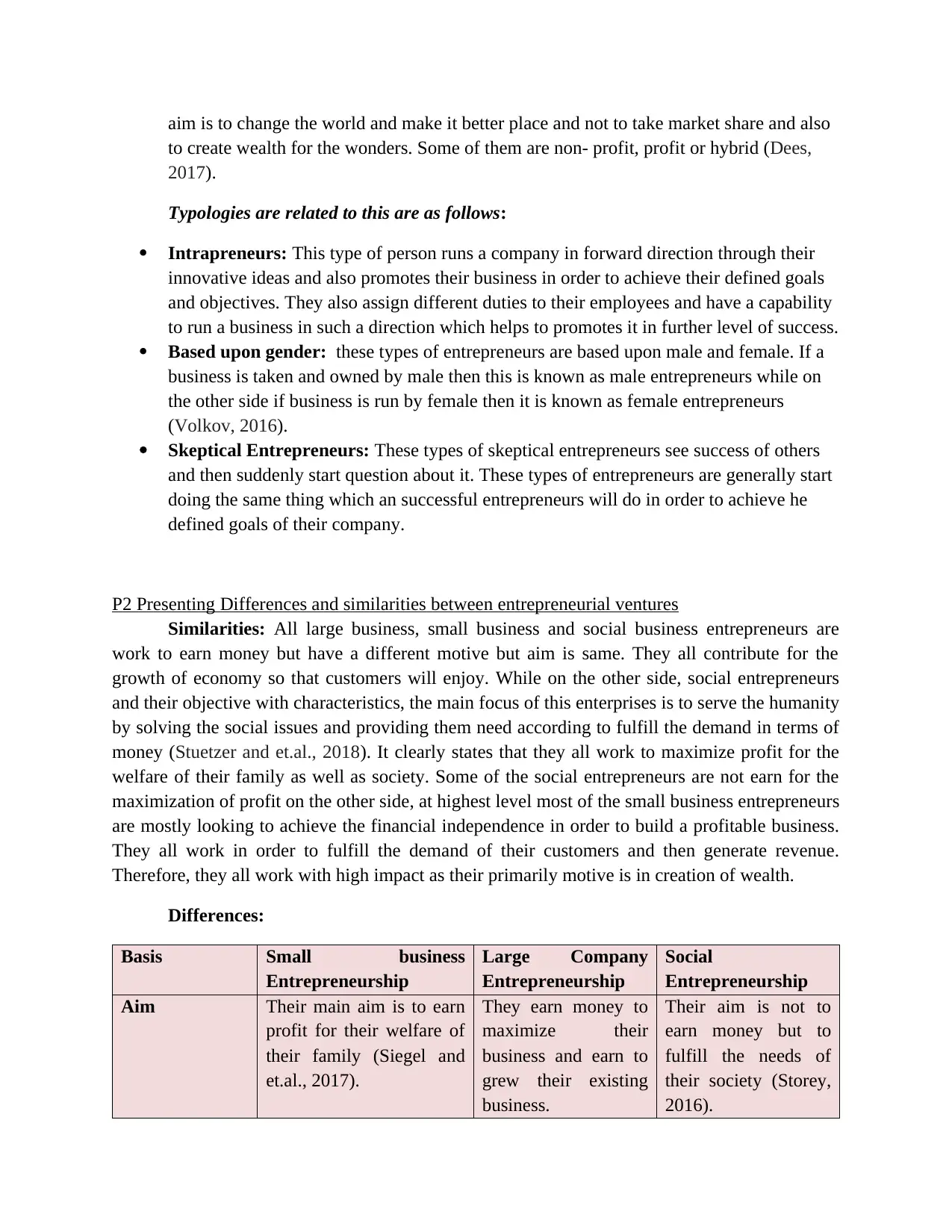
aim is to change the world and make it better place and not to take market share and also
to create wealth for the wonders. Some of them are non- profit, profit or hybrid (Dees,
2017).
Typologies are related to this are as follows:
Intrapreneurs: This type of person runs a company in forward direction through their
innovative ideas and also promotes their business in order to achieve their defined goals
and objectives. They also assign different duties to their employees and have a capability
to run a business in such a direction which helps to promotes it in further level of success.
Based upon gender: these types of entrepreneurs are based upon male and female. If a
business is taken and owned by male then this is known as male entrepreneurs while on
the other side if business is run by female then it is known as female entrepreneurs
(Volkov, 2016).
Skeptical Entrepreneurs: These types of skeptical entrepreneurs see success of others
and then suddenly start question about it. These types of entrepreneurs are generally start
doing the same thing which an successful entrepreneurs will do in order to achieve he
defined goals of their company.
P2 Presenting Differences and similarities between entrepreneurial ventures
Similarities: All large business, small business and social business entrepreneurs are
work to earn money but have a different motive but aim is same. They all contribute for the
growth of economy so that customers will enjoy. While on the other side, social entrepreneurs
and their objective with characteristics, the main focus of this enterprises is to serve the humanity
by solving the social issues and providing them need according to fulfill the demand in terms of
money (Stuetzer and et.al., 2018). It clearly states that they all work to maximize profit for the
welfare of their family as well as society. Some of the social entrepreneurs are not earn for the
maximization of profit on the other side, at highest level most of the small business entrepreneurs
are mostly looking to achieve the financial independence in order to build a profitable business.
They all work in order to fulfill the demand of their customers and then generate revenue.
Therefore, they all work with high impact as their primarily motive is in creation of wealth.
Differences:
Basis Small business
Entrepreneurship
Large Company
Entrepreneurship
Social
Entrepreneurship
Aim Their main aim is to earn
profit for their welfare of
their family (Siegel and
et.al., 2017).
They earn money to
maximize their
business and earn to
grew their existing
business.
Their aim is not to
earn money but to
fulfill the needs of
their society (Storey,
2016).
to create wealth for the wonders. Some of them are non- profit, profit or hybrid (Dees,
2017).
Typologies are related to this are as follows:
Intrapreneurs: This type of person runs a company in forward direction through their
innovative ideas and also promotes their business in order to achieve their defined goals
and objectives. They also assign different duties to their employees and have a capability
to run a business in such a direction which helps to promotes it in further level of success.
Based upon gender: these types of entrepreneurs are based upon male and female. If a
business is taken and owned by male then this is known as male entrepreneurs while on
the other side if business is run by female then it is known as female entrepreneurs
(Volkov, 2016).
Skeptical Entrepreneurs: These types of skeptical entrepreneurs see success of others
and then suddenly start question about it. These types of entrepreneurs are generally start
doing the same thing which an successful entrepreneurs will do in order to achieve he
defined goals of their company.
P2 Presenting Differences and similarities between entrepreneurial ventures
Similarities: All large business, small business and social business entrepreneurs are
work to earn money but have a different motive but aim is same. They all contribute for the
growth of economy so that customers will enjoy. While on the other side, social entrepreneurs
and their objective with characteristics, the main focus of this enterprises is to serve the humanity
by solving the social issues and providing them need according to fulfill the demand in terms of
money (Stuetzer and et.al., 2018). It clearly states that they all work to maximize profit for the
welfare of their family as well as society. Some of the social entrepreneurs are not earn for the
maximization of profit on the other side, at highest level most of the small business entrepreneurs
are mostly looking to achieve the financial independence in order to build a profitable business.
They all work in order to fulfill the demand of their customers and then generate revenue.
Therefore, they all work with high impact as their primarily motive is in creation of wealth.
Differences:
Basis Small business
Entrepreneurship
Large Company
Entrepreneurship
Social
Entrepreneurship
Aim Their main aim is to earn
profit for their welfare of
their family (Siegel and
et.al., 2017).
They earn money to
maximize their
business and earn to
grew their existing
business.
Their aim is not to
earn money but to
fulfill the needs of
their society (Storey,
2016).
Secure Best Marks with AI Grader
Need help grading? Try our AI Grader for instant feedback on your assignments.
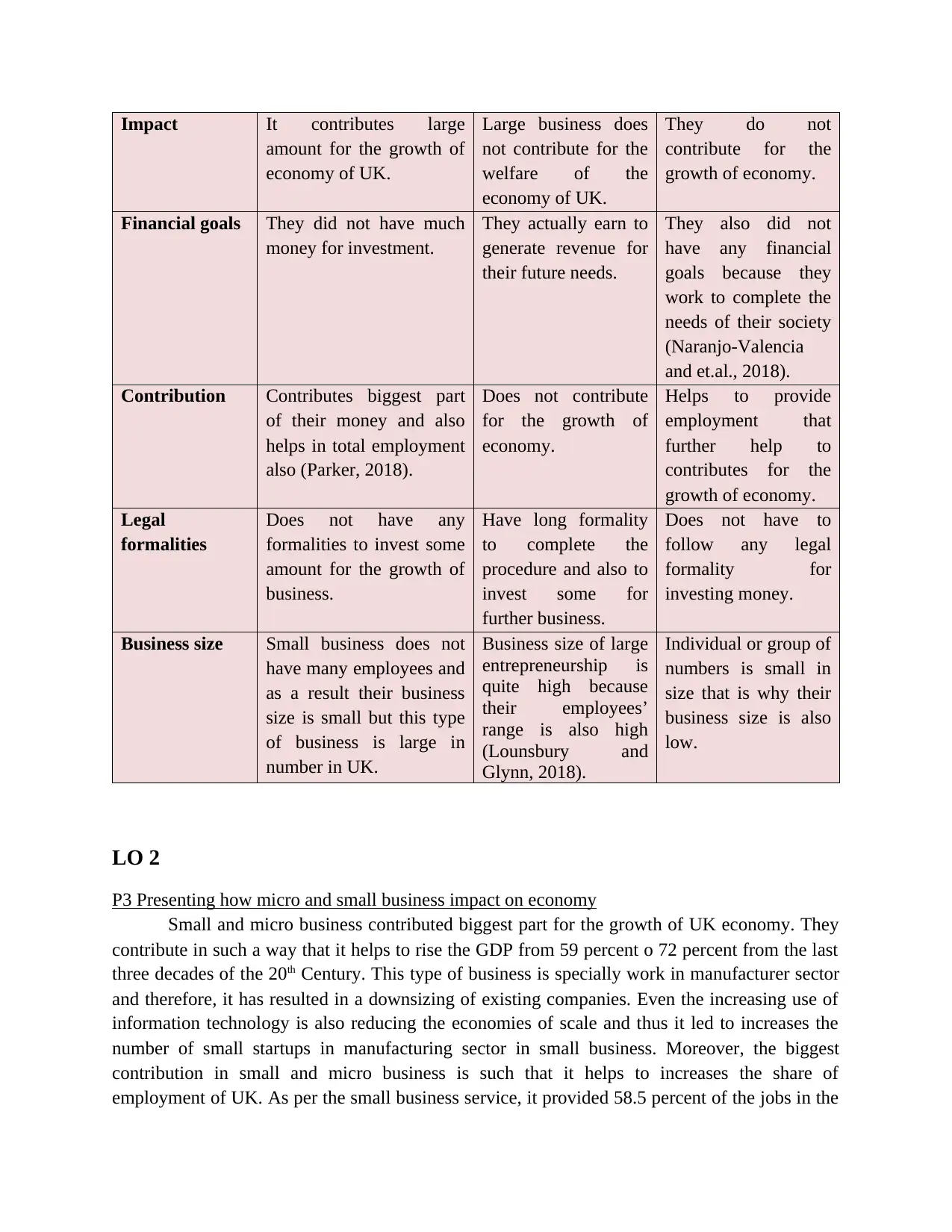
Impact It contributes large
amount for the growth of
economy of UK.
Large business does
not contribute for the
welfare of the
economy of UK.
They do not
contribute for the
growth of economy.
Financial goals They did not have much
money for investment.
They actually earn to
generate revenue for
their future needs.
They also did not
have any financial
goals because they
work to complete the
needs of their society
(Naranjo-Valencia
and et.al., 2018).
Contribution Contributes biggest part
of their money and also
helps in total employment
also (Parker, 2018).
Does not contribute
for the growth of
economy.
Helps to provide
employment that
further help to
contributes for the
growth of economy.
Legal
formalities
Does not have any
formalities to invest some
amount for the growth of
business.
Have long formality
to complete the
procedure and also to
invest some for
further business.
Does not have to
follow any legal
formality for
investing money.
Business size Small business does not
have many employees and
as a result their business
size is small but this type
of business is large in
number in UK.
Business size of large
entrepreneurship is
quite high because
their employees’
range is also high
(Lounsbury and
Glynn, 2018).
Individual or group of
numbers is small in
size that is why their
business size is also
low.
LO 2
P3 Presenting how micro and small business impact on economy
Small and micro business contributed biggest part for the growth of UK economy. They
contribute in such a way that it helps to rise the GDP from 59 percent o 72 percent from the last
three decades of the 20th Century. This type of business is specially work in manufacturer sector
and therefore, it has resulted in a downsizing of existing companies. Even the increasing use of
information technology is also reducing the economies of scale and thus it led to increases the
number of small startups in manufacturing sector in small business. Moreover, the biggest
contribution in small and micro business is such that it helps to increases the share of
employment of UK. As per the small business service, it provided 58.5 percent of the jobs in the
amount for the growth of
economy of UK.
Large business does
not contribute for the
welfare of the
economy of UK.
They do not
contribute for the
growth of economy.
Financial goals They did not have much
money for investment.
They actually earn to
generate revenue for
their future needs.
They also did not
have any financial
goals because they
work to complete the
needs of their society
(Naranjo-Valencia
and et.al., 2018).
Contribution Contributes biggest part
of their money and also
helps in total employment
also (Parker, 2018).
Does not contribute
for the growth of
economy.
Helps to provide
employment that
further help to
contributes for the
growth of economy.
Legal
formalities
Does not have any
formalities to invest some
amount for the growth of
business.
Have long formality
to complete the
procedure and also to
invest some for
further business.
Does not have to
follow any legal
formality for
investing money.
Business size Small business does not
have many employees and
as a result their business
size is small but this type
of business is large in
number in UK.
Business size of large
entrepreneurship is
quite high because
their employees’
range is also high
(Lounsbury and
Glynn, 2018).
Individual or group of
numbers is small in
size that is why their
business size is also
low.
LO 2
P3 Presenting how micro and small business impact on economy
Small and micro business contributed biggest part for the growth of UK economy. They
contribute in such a way that it helps to rise the GDP from 59 percent o 72 percent from the last
three decades of the 20th Century. This type of business is specially work in manufacturer sector
and therefore, it has resulted in a downsizing of existing companies. Even the increasing use of
information technology is also reducing the economies of scale and thus it led to increases the
number of small startups in manufacturing sector in small business. Moreover, the biggest
contribution in small and micro business is such that it helps to increases the share of
employment of UK. As per the small business service, it provided 58.5 percent of the jobs in the
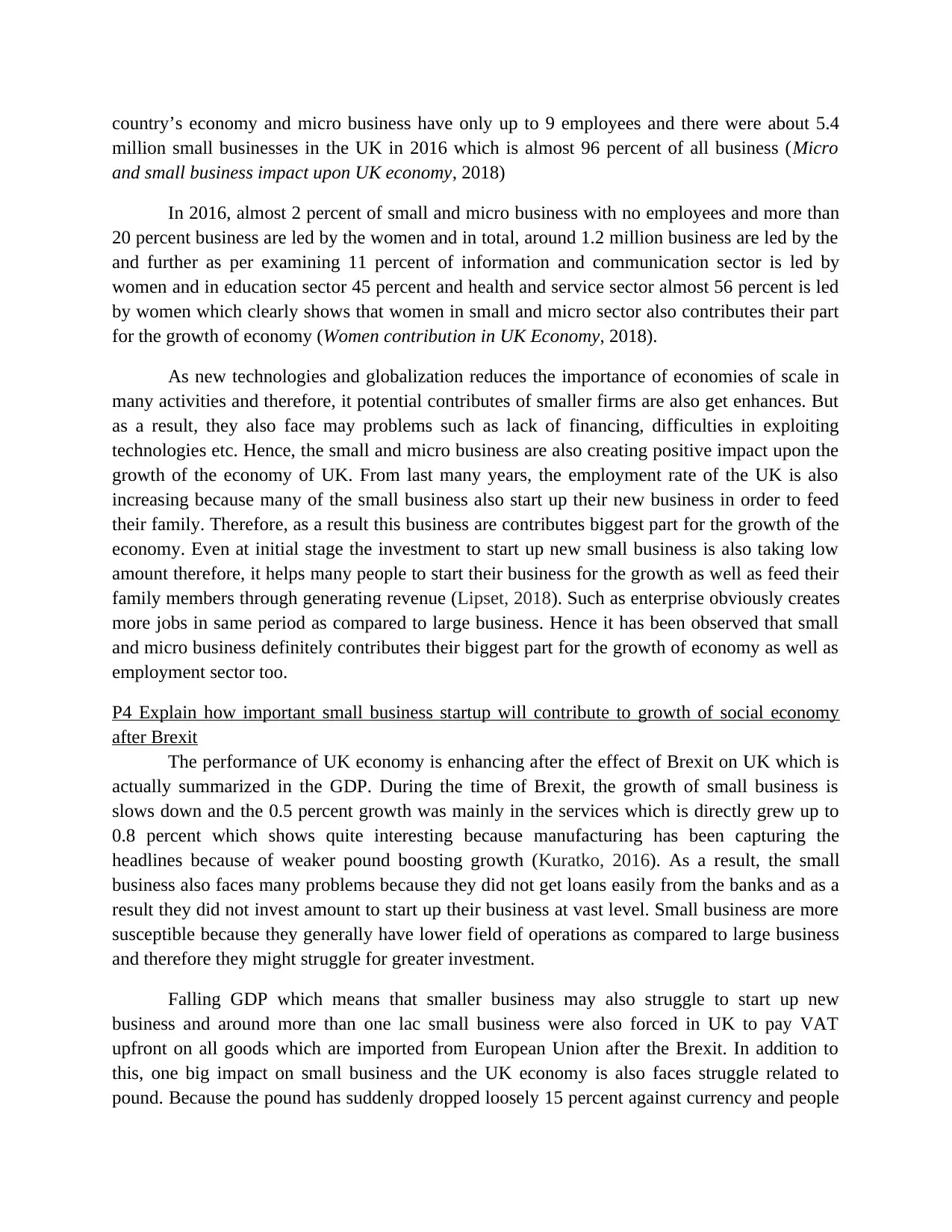
country’s economy and micro business have only up to 9 employees and there were about 5.4
million small businesses in the UK in 2016 which is almost 96 percent of all business (Micro
and small business impact upon UK economy, 2018)
In 2016, almost 2 percent of small and micro business with no employees and more than
20 percent business are led by the women and in total, around 1.2 million business are led by the
and further as per examining 11 percent of information and communication sector is led by
women and in education sector 45 percent and health and service sector almost 56 percent is led
by women which clearly shows that women in small and micro sector also contributes their part
for the growth of economy (Women contribution in UK Economy, 2018).
As new technologies and globalization reduces the importance of economies of scale in
many activities and therefore, it potential contributes of smaller firms are also get enhances. But
as a result, they also face may problems such as lack of financing, difficulties in exploiting
technologies etc. Hence, the small and micro business are also creating positive impact upon the
growth of the economy of UK. From last many years, the employment rate of the UK is also
increasing because many of the small business also start up their new business in order to feed
their family. Therefore, as a result this business are contributes biggest part for the growth of the
economy. Even at initial stage the investment to start up new small business is also taking low
amount therefore, it helps many people to start their business for the growth as well as feed their
family members through generating revenue (Lipset, 2018). Such as enterprise obviously creates
more jobs in same period as compared to large business. Hence it has been observed that small
and micro business definitely contributes their biggest part for the growth of economy as well as
employment sector too.
P4 Explain how important small business startup will contribute to growth of social economy
after Brexit
The performance of UK economy is enhancing after the effect of Brexit on UK which is
actually summarized in the GDP. During the time of Brexit, the growth of small business is
slows down and the 0.5 percent growth was mainly in the services which is directly grew up to
0.8 percent which shows quite interesting because manufacturing has been capturing the
headlines because of weaker pound boosting growth (Kuratko, 2016). As a result, the small
business also faces many problems because they did not get loans easily from the banks and as a
result they did not invest amount to start up their business at vast level. Small business are more
susceptible because they generally have lower field of operations as compared to large business
and therefore they might struggle for greater investment.
Falling GDP which means that smaller business may also struggle to start up new
business and around more than one lac small business were also forced in UK to pay VAT
upfront on all goods which are imported from European Union after the Brexit. In addition to
this, one big impact on small business and the UK economy is also faces struggle related to
pound. Because the pound has suddenly dropped loosely 15 percent against currency and people
million small businesses in the UK in 2016 which is almost 96 percent of all business (Micro
and small business impact upon UK economy, 2018)
In 2016, almost 2 percent of small and micro business with no employees and more than
20 percent business are led by the women and in total, around 1.2 million business are led by the
and further as per examining 11 percent of information and communication sector is led by
women and in education sector 45 percent and health and service sector almost 56 percent is led
by women which clearly shows that women in small and micro sector also contributes their part
for the growth of economy (Women contribution in UK Economy, 2018).
As new technologies and globalization reduces the importance of economies of scale in
many activities and therefore, it potential contributes of smaller firms are also get enhances. But
as a result, they also face may problems such as lack of financing, difficulties in exploiting
technologies etc. Hence, the small and micro business are also creating positive impact upon the
growth of the economy of UK. From last many years, the employment rate of the UK is also
increasing because many of the small business also start up their new business in order to feed
their family. Therefore, as a result this business are contributes biggest part for the growth of the
economy. Even at initial stage the investment to start up new small business is also taking low
amount therefore, it helps many people to start their business for the growth as well as feed their
family members through generating revenue (Lipset, 2018). Such as enterprise obviously creates
more jobs in same period as compared to large business. Hence it has been observed that small
and micro business definitely contributes their biggest part for the growth of economy as well as
employment sector too.
P4 Explain how important small business startup will contribute to growth of social economy
after Brexit
The performance of UK economy is enhancing after the effect of Brexit on UK which is
actually summarized in the GDP. During the time of Brexit, the growth of small business is
slows down and the 0.5 percent growth was mainly in the services which is directly grew up to
0.8 percent which shows quite interesting because manufacturing has been capturing the
headlines because of weaker pound boosting growth (Kuratko, 2016). As a result, the small
business also faces many problems because they did not get loans easily from the banks and as a
result they did not invest amount to start up their business at vast level. Small business are more
susceptible because they generally have lower field of operations as compared to large business
and therefore they might struggle for greater investment.
Falling GDP which means that smaller business may also struggle to start up new
business and around more than one lac small business were also forced in UK to pay VAT
upfront on all goods which are imported from European Union after the Brexit. In addition to
this, one big impact on small business and the UK economy is also faces struggle related to
pound. Because the pound has suddenly dropped loosely 15 percent against currency and people
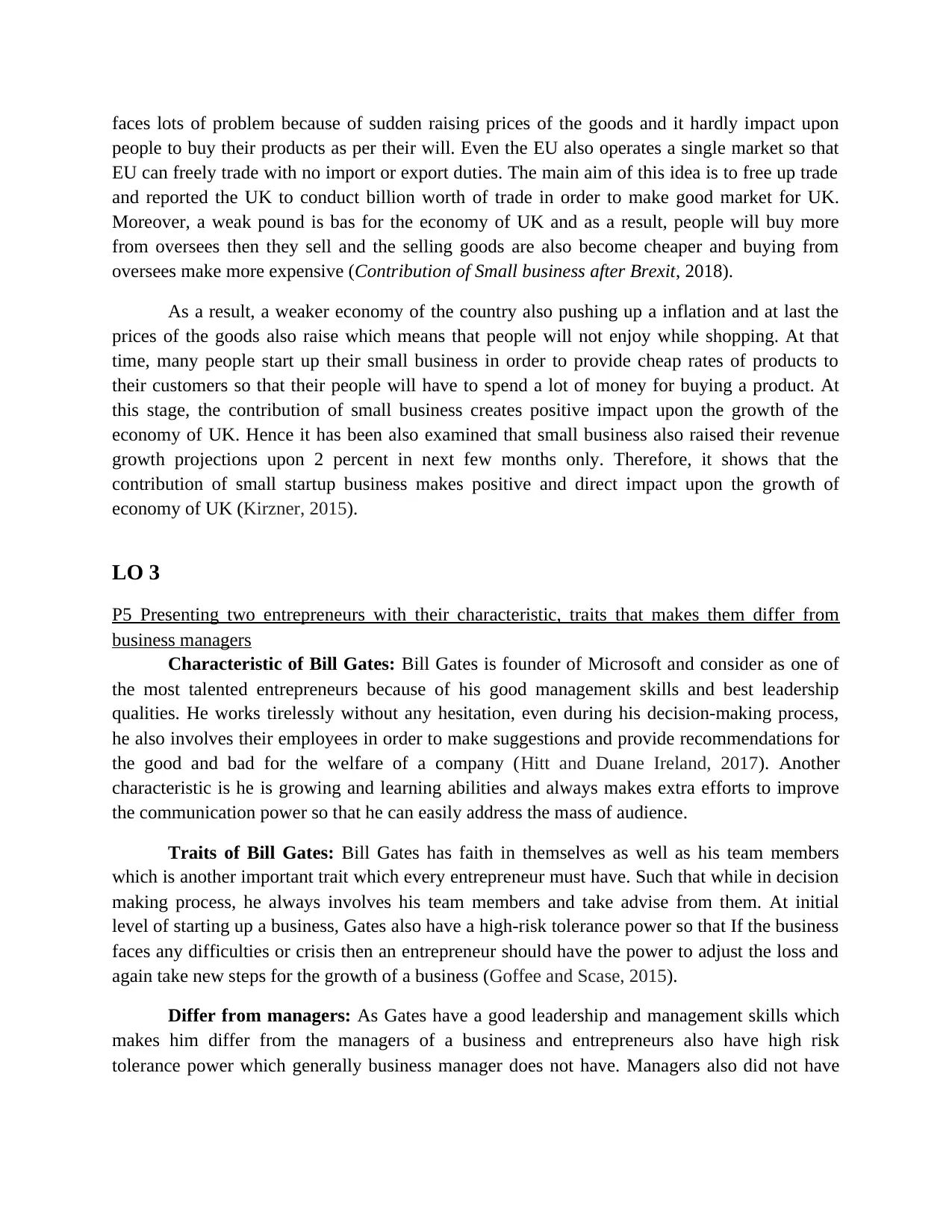
faces lots of problem because of sudden raising prices of the goods and it hardly impact upon
people to buy their products as per their will. Even the EU also operates a single market so that
EU can freely trade with no import or export duties. The main aim of this idea is to free up trade
and reported the UK to conduct billion worth of trade in order to make good market for UK.
Moreover, a weak pound is bas for the economy of UK and as a result, people will buy more
from oversees then they sell and the selling goods are also become cheaper and buying from
oversees make more expensive (Contribution of Small business after Brexit, 2018).
As a result, a weaker economy of the country also pushing up a inflation and at last the
prices of the goods also raise which means that people will not enjoy while shopping. At that
time, many people start up their small business in order to provide cheap rates of products to
their customers so that their people will have to spend a lot of money for buying a product. At
this stage, the contribution of small business creates positive impact upon the growth of the
economy of UK. Hence it has been also examined that small business also raised their revenue
growth projections upon 2 percent in next few months only. Therefore, it shows that the
contribution of small startup business makes positive and direct impact upon the growth of
economy of UK (Kirzner, 2015).
LO 3
P5 Presenting two entrepreneurs with their characteristic, traits that makes them differ from
business managers
Characteristic of Bill Gates: Bill Gates is founder of Microsoft and consider as one of
the most talented entrepreneurs because of his good management skills and best leadership
qualities. He works tirelessly without any hesitation, even during his decision-making process,
he also involves their employees in order to make suggestions and provide recommendations for
the good and bad for the welfare of a company (Hitt and Duane Ireland, 2017). Another
characteristic is he is growing and learning abilities and always makes extra efforts to improve
the communication power so that he can easily address the mass of audience.
Traits of Bill Gates: Bill Gates has faith in themselves as well as his team members
which is another important trait which every entrepreneur must have. Such that while in decision
making process, he always involves his team members and take advise from them. At initial
level of starting up a business, Gates also have a high-risk tolerance power so that If the business
faces any difficulties or crisis then an entrepreneur should have the power to adjust the loss and
again take new steps for the growth of a business (Goffee and Scase, 2015).
Differ from managers: As Gates have a good leadership and management skills which
makes him differ from the managers of a business and entrepreneurs also have high risk
tolerance power which generally business manager does not have. Managers also did not have
people to buy their products as per their will. Even the EU also operates a single market so that
EU can freely trade with no import or export duties. The main aim of this idea is to free up trade
and reported the UK to conduct billion worth of trade in order to make good market for UK.
Moreover, a weak pound is bas for the economy of UK and as a result, people will buy more
from oversees then they sell and the selling goods are also become cheaper and buying from
oversees make more expensive (Contribution of Small business after Brexit, 2018).
As a result, a weaker economy of the country also pushing up a inflation and at last the
prices of the goods also raise which means that people will not enjoy while shopping. At that
time, many people start up their small business in order to provide cheap rates of products to
their customers so that their people will have to spend a lot of money for buying a product. At
this stage, the contribution of small business creates positive impact upon the growth of the
economy of UK. Hence it has been also examined that small business also raised their revenue
growth projections upon 2 percent in next few months only. Therefore, it shows that the
contribution of small startup business makes positive and direct impact upon the growth of
economy of UK (Kirzner, 2015).
LO 3
P5 Presenting two entrepreneurs with their characteristic, traits that makes them differ from
business managers
Characteristic of Bill Gates: Bill Gates is founder of Microsoft and consider as one of
the most talented entrepreneurs because of his good management skills and best leadership
qualities. He works tirelessly without any hesitation, even during his decision-making process,
he also involves their employees in order to make suggestions and provide recommendations for
the good and bad for the welfare of a company (Hitt and Duane Ireland, 2017). Another
characteristic is he is growing and learning abilities and always makes extra efforts to improve
the communication power so that he can easily address the mass of audience.
Traits of Bill Gates: Bill Gates has faith in themselves as well as his team members
which is another important trait which every entrepreneur must have. Such that while in decision
making process, he always involves his team members and take advise from them. At initial
level of starting up a business, Gates also have a high-risk tolerance power so that If the business
faces any difficulties or crisis then an entrepreneur should have the power to adjust the loss and
again take new steps for the growth of a business (Goffee and Scase, 2015).
Differ from managers: As Gates have a good leadership and management skills which
makes him differ from the managers of a business and entrepreneurs also have high risk
tolerance power which generally business manager does not have. Managers also did not have
Paraphrase This Document
Need a fresh take? Get an instant paraphrase of this document with our AI Paraphraser
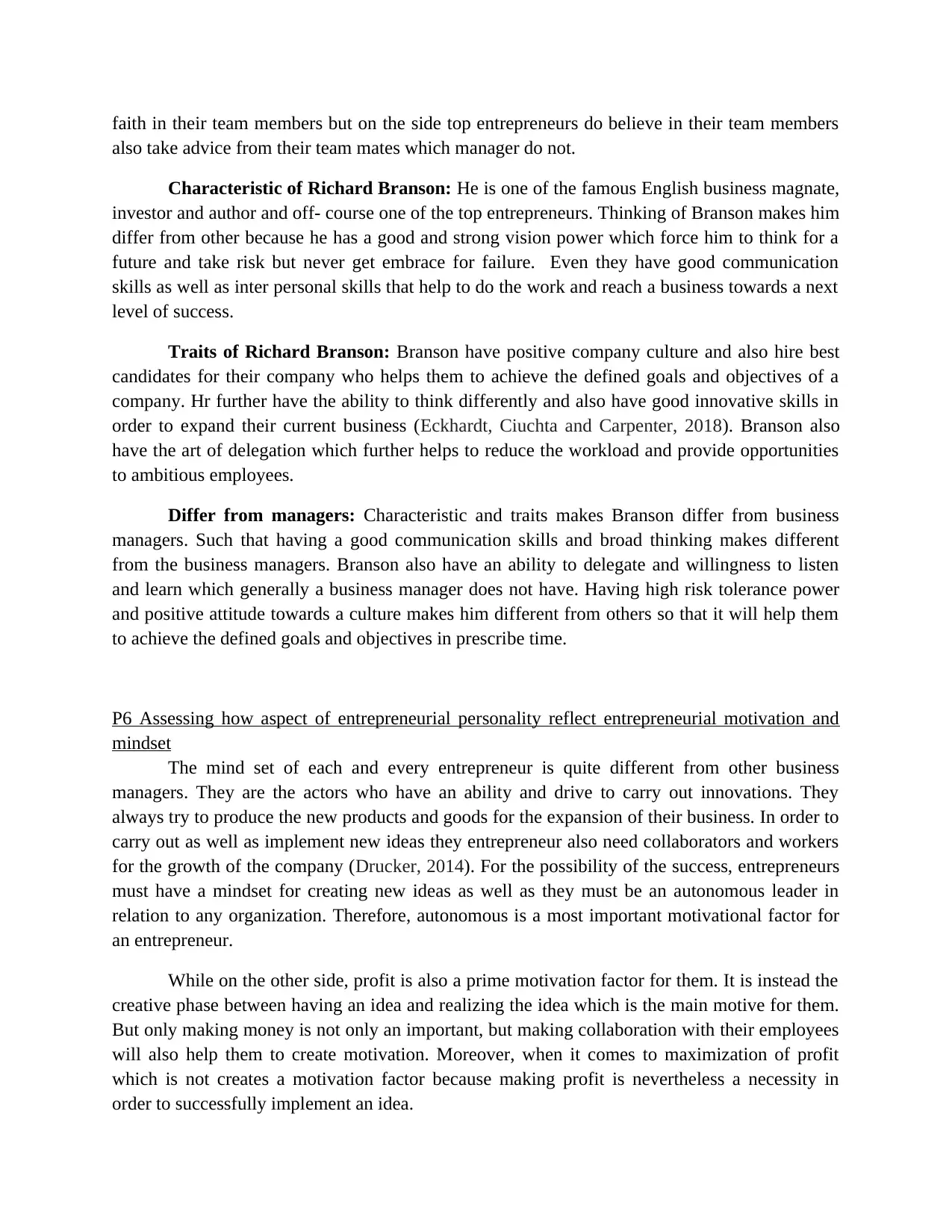
faith in their team members but on the side top entrepreneurs do believe in their team members
also take advice from their team mates which manager do not.
Characteristic of Richard Branson: He is one of the famous English business magnate,
investor and author and off- course one of the top entrepreneurs. Thinking of Branson makes him
differ from other because he has a good and strong vision power which force him to think for a
future and take risk but never get embrace for failure. Even they have good communication
skills as well as inter personal skills that help to do the work and reach a business towards a next
level of success.
Traits of Richard Branson: Branson have positive company culture and also hire best
candidates for their company who helps them to achieve the defined goals and objectives of a
company. Hr further have the ability to think differently and also have good innovative skills in
order to expand their current business (Eckhardt, Ciuchta and Carpenter, 2018). Branson also
have the art of delegation which further helps to reduce the workload and provide opportunities
to ambitious employees.
Differ from managers: Characteristic and traits makes Branson differ from business
managers. Such that having a good communication skills and broad thinking makes different
from the business managers. Branson also have an ability to delegate and willingness to listen
and learn which generally a business manager does not have. Having high risk tolerance power
and positive attitude towards a culture makes him different from others so that it will help them
to achieve the defined goals and objectives in prescribe time.
P6 Assessing how aspect of entrepreneurial personality reflect entrepreneurial motivation and
mindset
The mind set of each and every entrepreneur is quite different from other business
managers. They are the actors who have an ability and drive to carry out innovations. They
always try to produce the new products and goods for the expansion of their business. In order to
carry out as well as implement new ideas they entrepreneur also need collaborators and workers
for the growth of the company (Drucker, 2014). For the possibility of the success, entrepreneurs
must have a mindset for creating new ideas as well as they must be an autonomous leader in
relation to any organization. Therefore, autonomous is a most important motivational factor for
an entrepreneur.
While on the other side, profit is also a prime motivation factor for them. It is instead the
creative phase between having an idea and realizing the idea which is the main motive for them.
But only making money is not only an important, but making collaboration with their employees
will also help them to create motivation. Moreover, when it comes to maximization of profit
which is not creates a motivation factor because making profit is nevertheless a necessity in
order to successfully implement an idea.
also take advice from their team mates which manager do not.
Characteristic of Richard Branson: He is one of the famous English business magnate,
investor and author and off- course one of the top entrepreneurs. Thinking of Branson makes him
differ from other because he has a good and strong vision power which force him to think for a
future and take risk but never get embrace for failure. Even they have good communication
skills as well as inter personal skills that help to do the work and reach a business towards a next
level of success.
Traits of Richard Branson: Branson have positive company culture and also hire best
candidates for their company who helps them to achieve the defined goals and objectives of a
company. Hr further have the ability to think differently and also have good innovative skills in
order to expand their current business (Eckhardt, Ciuchta and Carpenter, 2018). Branson also
have the art of delegation which further helps to reduce the workload and provide opportunities
to ambitious employees.
Differ from managers: Characteristic and traits makes Branson differ from business
managers. Such that having a good communication skills and broad thinking makes different
from the business managers. Branson also have an ability to delegate and willingness to listen
and learn which generally a business manager does not have. Having high risk tolerance power
and positive attitude towards a culture makes him different from others so that it will help them
to achieve the defined goals and objectives in prescribe time.
P6 Assessing how aspect of entrepreneurial personality reflect entrepreneurial motivation and
mindset
The mind set of each and every entrepreneur is quite different from other business
managers. They are the actors who have an ability and drive to carry out innovations. They
always try to produce the new products and goods for the expansion of their business. In order to
carry out as well as implement new ideas they entrepreneur also need collaborators and workers
for the growth of the company (Drucker, 2014). For the possibility of the success, entrepreneurs
must have a mindset for creating new ideas as well as they must be an autonomous leader in
relation to any organization. Therefore, autonomous is a most important motivational factor for
an entrepreneur.
While on the other side, profit is also a prime motivation factor for them. It is instead the
creative phase between having an idea and realizing the idea which is the main motive for them.
But only making money is not only an important, but making collaboration with their employees
will also help them to create motivation. Moreover, when it comes to maximization of profit
which is not creates a motivation factor because making profit is nevertheless a necessity in
order to successfully implement an idea.
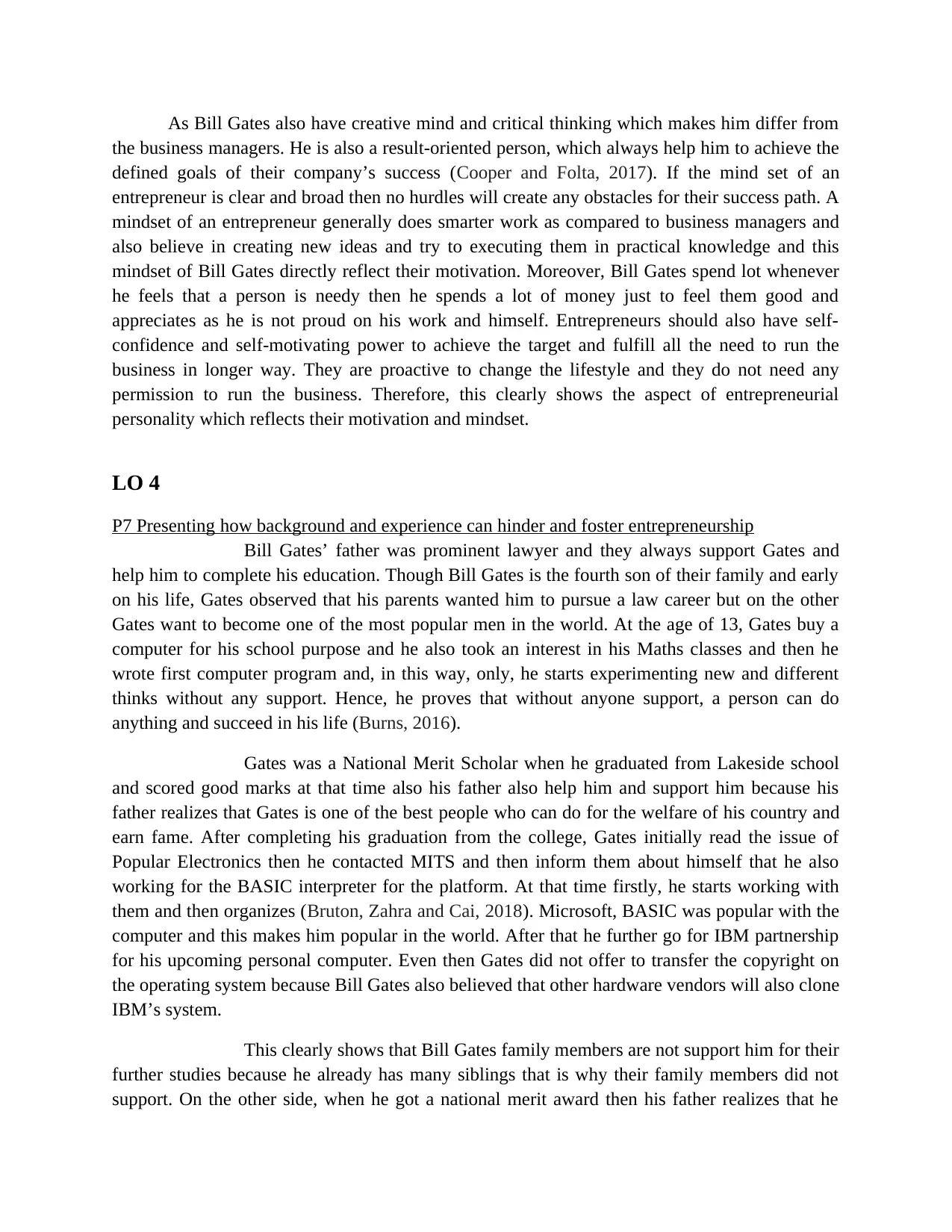
As Bill Gates also have creative mind and critical thinking which makes him differ from
the business managers. He is also a result-oriented person, which always help him to achieve the
defined goals of their company’s success (Cooper and Folta, 2017). If the mind set of an
entrepreneur is clear and broad then no hurdles will create any obstacles for their success path. A
mindset of an entrepreneur generally does smarter work as compared to business managers and
also believe in creating new ideas and try to executing them in practical knowledge and this
mindset of Bill Gates directly reflect their motivation. Moreover, Bill Gates spend lot whenever
he feels that a person is needy then he spends a lot of money just to feel them good and
appreciates as he is not proud on his work and himself. Entrepreneurs should also have self-
confidence and self-motivating power to achieve the target and fulfill all the need to run the
business in longer way. They are proactive to change the lifestyle and they do not need any
permission to run the business. Therefore, this clearly shows the aspect of entrepreneurial
personality which reflects their motivation and mindset.
LO 4
P7 Presenting how background and experience can hinder and foster entrepreneurship
Bill Gates’ father was prominent lawyer and they always support Gates and
help him to complete his education. Though Bill Gates is the fourth son of their family and early
on his life, Gates observed that his parents wanted him to pursue a law career but on the other
Gates want to become one of the most popular men in the world. At the age of 13, Gates buy a
computer for his school purpose and he also took an interest in his Maths classes and then he
wrote first computer program and, in this way, only, he starts experimenting new and different
thinks without any support. Hence, he proves that without anyone support, a person can do
anything and succeed in his life (Burns, 2016).
Gates was a National Merit Scholar when he graduated from Lakeside school
and scored good marks at that time also his father also help him and support him because his
father realizes that Gates is one of the best people who can do for the welfare of his country and
earn fame. After completing his graduation from the college, Gates initially read the issue of
Popular Electronics then he contacted MITS and then inform them about himself that he also
working for the BASIC interpreter for the platform. At that time firstly, he starts working with
them and then organizes (Bruton, Zahra and Cai, 2018). Microsoft, BASIC was popular with the
computer and this makes him popular in the world. After that he further go for IBM partnership
for his upcoming personal computer. Even then Gates did not offer to transfer the copyright on
the operating system because Bill Gates also believed that other hardware vendors will also clone
IBM’s system.
This clearly shows that Bill Gates family members are not support him for their
further studies because he already has many siblings that is why their family members did not
support. On the other side, when he got a national merit award then his father realizes that he
the business managers. He is also a result-oriented person, which always help him to achieve the
defined goals of their company’s success (Cooper and Folta, 2017). If the mind set of an
entrepreneur is clear and broad then no hurdles will create any obstacles for their success path. A
mindset of an entrepreneur generally does smarter work as compared to business managers and
also believe in creating new ideas and try to executing them in practical knowledge and this
mindset of Bill Gates directly reflect their motivation. Moreover, Bill Gates spend lot whenever
he feels that a person is needy then he spends a lot of money just to feel them good and
appreciates as he is not proud on his work and himself. Entrepreneurs should also have self-
confidence and self-motivating power to achieve the target and fulfill all the need to run the
business in longer way. They are proactive to change the lifestyle and they do not need any
permission to run the business. Therefore, this clearly shows the aspect of entrepreneurial
personality which reflects their motivation and mindset.
LO 4
P7 Presenting how background and experience can hinder and foster entrepreneurship
Bill Gates’ father was prominent lawyer and they always support Gates and
help him to complete his education. Though Bill Gates is the fourth son of their family and early
on his life, Gates observed that his parents wanted him to pursue a law career but on the other
Gates want to become one of the most popular men in the world. At the age of 13, Gates buy a
computer for his school purpose and he also took an interest in his Maths classes and then he
wrote first computer program and, in this way, only, he starts experimenting new and different
thinks without any support. Hence, he proves that without anyone support, a person can do
anything and succeed in his life (Burns, 2016).
Gates was a National Merit Scholar when he graduated from Lakeside school
and scored good marks at that time also his father also help him and support him because his
father realizes that Gates is one of the best people who can do for the welfare of his country and
earn fame. After completing his graduation from the college, Gates initially read the issue of
Popular Electronics then he contacted MITS and then inform them about himself that he also
working for the BASIC interpreter for the platform. At that time firstly, he starts working with
them and then organizes (Bruton, Zahra and Cai, 2018). Microsoft, BASIC was popular with the
computer and this makes him popular in the world. After that he further go for IBM partnership
for his upcoming personal computer. Even then Gates did not offer to transfer the copyright on
the operating system because Bill Gates also believed that other hardware vendors will also clone
IBM’s system.
This clearly shows that Bill Gates family members are not support him for their
further studies because he already has many siblings that is why their family members did not
support. On the other side, when he got a national merit award then his father realizes that he
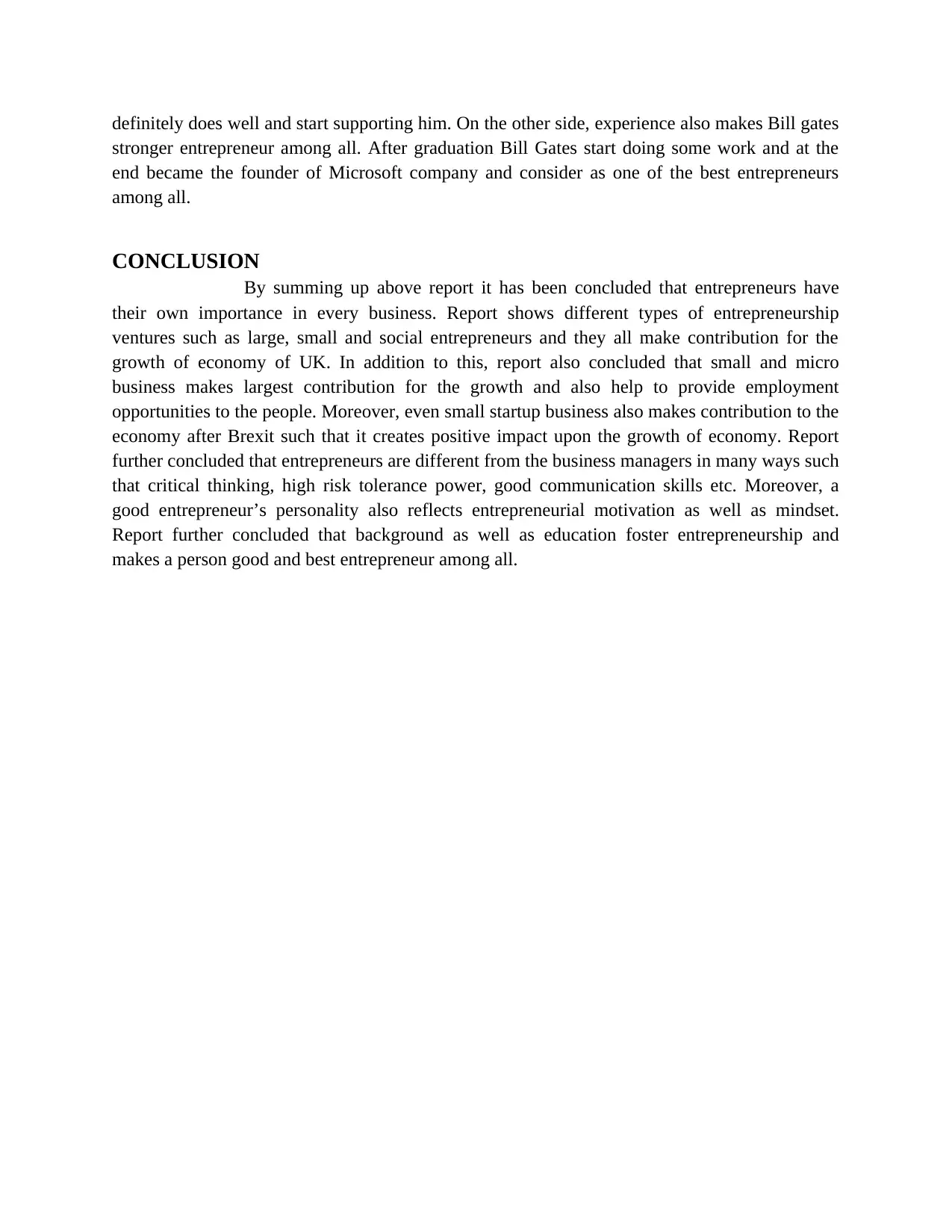
definitely does well and start supporting him. On the other side, experience also makes Bill gates
stronger entrepreneur among all. After graduation Bill Gates start doing some work and at the
end became the founder of Microsoft company and consider as one of the best entrepreneurs
among all.
CONCLUSION
By summing up above report it has been concluded that entrepreneurs have
their own importance in every business. Report shows different types of entrepreneurship
ventures such as large, small and social entrepreneurs and they all make contribution for the
growth of economy of UK. In addition to this, report also concluded that small and micro
business makes largest contribution for the growth and also help to provide employment
opportunities to the people. Moreover, even small startup business also makes contribution to the
economy after Brexit such that it creates positive impact upon the growth of economy. Report
further concluded that entrepreneurs are different from the business managers in many ways such
that critical thinking, high risk tolerance power, good communication skills etc. Moreover, a
good entrepreneur’s personality also reflects entrepreneurial motivation as well as mindset.
Report further concluded that background as well as education foster entrepreneurship and
makes a person good and best entrepreneur among all.
stronger entrepreneur among all. After graduation Bill Gates start doing some work and at the
end became the founder of Microsoft company and consider as one of the best entrepreneurs
among all.
CONCLUSION
By summing up above report it has been concluded that entrepreneurs have
their own importance in every business. Report shows different types of entrepreneurship
ventures such as large, small and social entrepreneurs and they all make contribution for the
growth of economy of UK. In addition to this, report also concluded that small and micro
business makes largest contribution for the growth and also help to provide employment
opportunities to the people. Moreover, even small startup business also makes contribution to the
economy after Brexit such that it creates positive impact upon the growth of economy. Report
further concluded that entrepreneurs are different from the business managers in many ways such
that critical thinking, high risk tolerance power, good communication skills etc. Moreover, a
good entrepreneur’s personality also reflects entrepreneurial motivation as well as mindset.
Report further concluded that background as well as education foster entrepreneurship and
makes a person good and best entrepreneur among all.
Secure Best Marks with AI Grader
Need help grading? Try our AI Grader for instant feedback on your assignments.
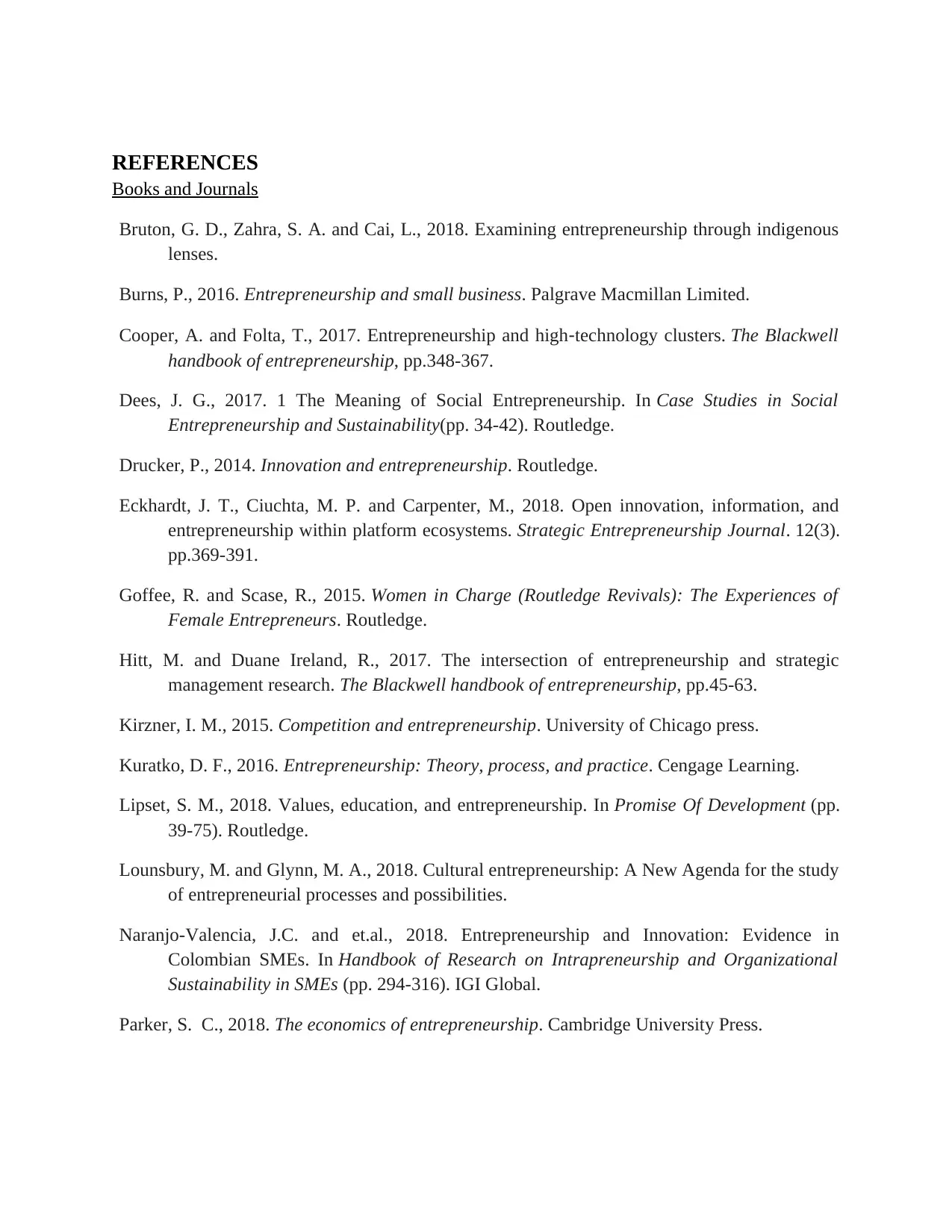
REFERENCES
Books and Journals
Bruton, G. D., Zahra, S. A. and Cai, L., 2018. Examining entrepreneurship through indigenous
lenses.
Burns, P., 2016. Entrepreneurship and small business. Palgrave Macmillan Limited.
Cooper, A. and Folta, T., 2017. Entrepreneurship and high‐technology clusters. The Blackwell
handbook of entrepreneurship, pp.348-367.
Dees, J. G., 2017. 1 The Meaning of Social Entrepreneurship. In Case Studies in Social
Entrepreneurship and Sustainability(pp. 34-42). Routledge.
Drucker, P., 2014. Innovation and entrepreneurship. Routledge.
Eckhardt, J. T., Ciuchta, M. P. and Carpenter, M., 2018. Open innovation, information, and
entrepreneurship within platform ecosystems. Strategic Entrepreneurship Journal. 12(3).
pp.369-391.
Goffee, R. and Scase, R., 2015. Women in Charge (Routledge Revivals): The Experiences of
Female Entrepreneurs. Routledge.
Hitt, M. and Duane Ireland, R., 2017. The intersection of entrepreneurship and strategic
management research. The Blackwell handbook of entrepreneurship, pp.45-63.
Kirzner, I. M., 2015. Competition and entrepreneurship. University of Chicago press.
Kuratko, D. F., 2016. Entrepreneurship: Theory, process, and practice. Cengage Learning.
Lipset, S. M., 2018. Values, education, and entrepreneurship. In Promise Of Development (pp.
39-75). Routledge.
Lounsbury, M. and Glynn, M. A., 2018. Cultural entrepreneurship: A New Agenda for the study
of entrepreneurial processes and possibilities.
Naranjo-Valencia, J.C. and et.al., 2018. Entrepreneurship and Innovation: Evidence in
Colombian SMEs. In Handbook of Research on Intrapreneurship and Organizational
Sustainability in SMEs (pp. 294-316). IGI Global.
Parker, S. C., 2018. The economics of entrepreneurship. Cambridge University Press.
Books and Journals
Bruton, G. D., Zahra, S. A. and Cai, L., 2018. Examining entrepreneurship through indigenous
lenses.
Burns, P., 2016. Entrepreneurship and small business. Palgrave Macmillan Limited.
Cooper, A. and Folta, T., 2017. Entrepreneurship and high‐technology clusters. The Blackwell
handbook of entrepreneurship, pp.348-367.
Dees, J. G., 2017. 1 The Meaning of Social Entrepreneurship. In Case Studies in Social
Entrepreneurship and Sustainability(pp. 34-42). Routledge.
Drucker, P., 2014. Innovation and entrepreneurship. Routledge.
Eckhardt, J. T., Ciuchta, M. P. and Carpenter, M., 2018. Open innovation, information, and
entrepreneurship within platform ecosystems. Strategic Entrepreneurship Journal. 12(3).
pp.369-391.
Goffee, R. and Scase, R., 2015. Women in Charge (Routledge Revivals): The Experiences of
Female Entrepreneurs. Routledge.
Hitt, M. and Duane Ireland, R., 2017. The intersection of entrepreneurship and strategic
management research. The Blackwell handbook of entrepreneurship, pp.45-63.
Kirzner, I. M., 2015. Competition and entrepreneurship. University of Chicago press.
Kuratko, D. F., 2016. Entrepreneurship: Theory, process, and practice. Cengage Learning.
Lipset, S. M., 2018. Values, education, and entrepreneurship. In Promise Of Development (pp.
39-75). Routledge.
Lounsbury, M. and Glynn, M. A., 2018. Cultural entrepreneurship: A New Agenda for the study
of entrepreneurial processes and possibilities.
Naranjo-Valencia, J.C. and et.al., 2018. Entrepreneurship and Innovation: Evidence in
Colombian SMEs. In Handbook of Research on Intrapreneurship and Organizational
Sustainability in SMEs (pp. 294-316). IGI Global.
Parker, S. C., 2018. The economics of entrepreneurship. Cambridge University Press.
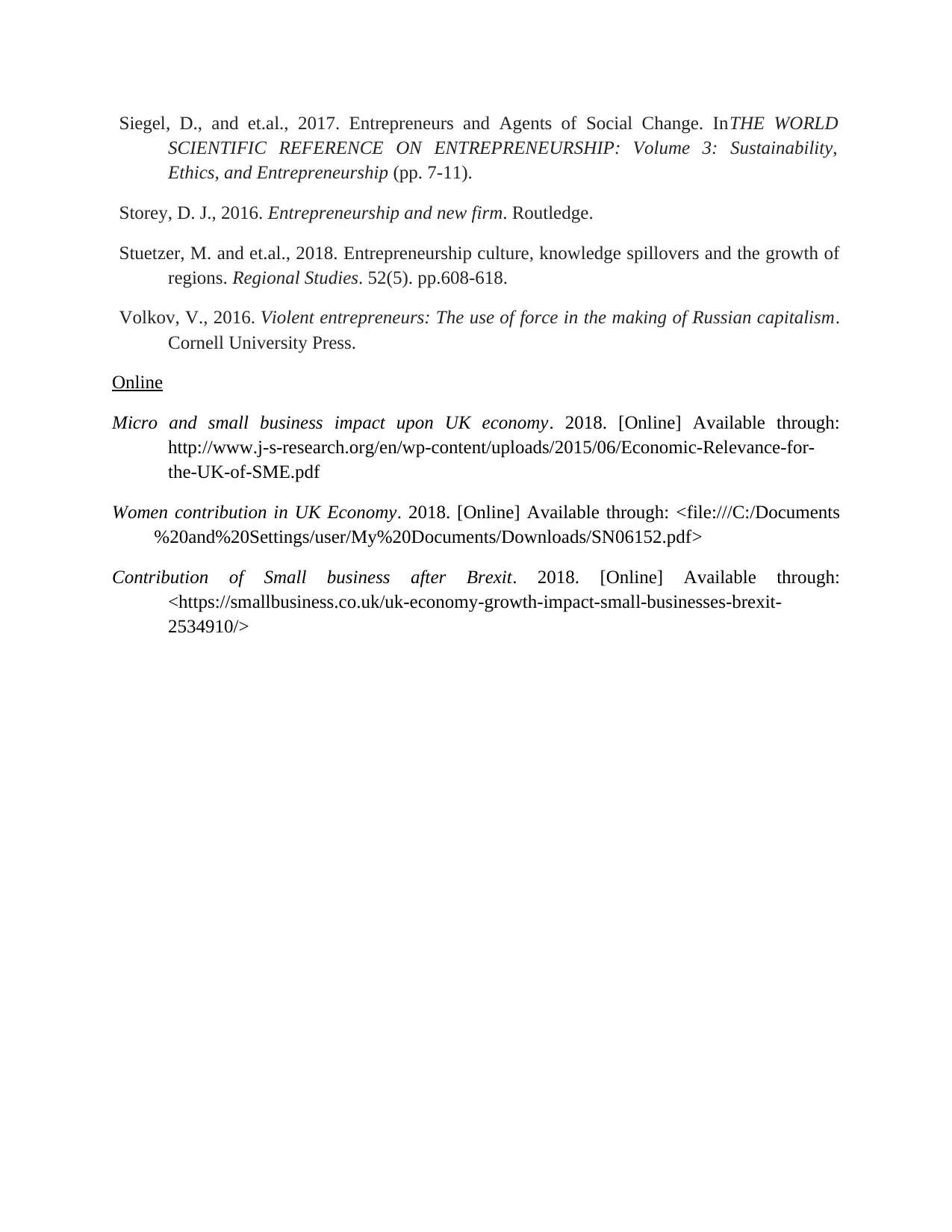
Siegel, D., and et.al., 2017. Entrepreneurs and Agents of Social Change. InTHE WORLD
SCIENTIFIC REFERENCE ON ENTREPRENEURSHIP: Volume 3: Sustainability,
Ethics, and Entrepreneurship (pp. 7-11).
Storey, D. J., 2016. Entrepreneurship and new firm. Routledge.
Stuetzer, M. and et.al., 2018. Entrepreneurship culture, knowledge spillovers and the growth of
regions. Regional Studies. 52(5). pp.608-618.
Volkov, V., 2016. Violent entrepreneurs: The use of force in the making of Russian capitalism.
Cornell University Press.
Online
Micro and small business impact upon UK economy. 2018. [Online] Available through:
http://www.j-s-research.org/en/wp-content/uploads/2015/06/Economic-Relevance-for-
the-UK-of-SME.pdf
Women contribution in UK Economy. 2018. [Online] Available through: <file:///C:/Documents
%20and%20Settings/user/My%20Documents/Downloads/SN06152.pdf>
Contribution of Small business after Brexit. 2018. [Online] Available through:
<https://smallbusiness.co.uk/uk-economy-growth-impact-small-businesses-brexit-
2534910/>
SCIENTIFIC REFERENCE ON ENTREPRENEURSHIP: Volume 3: Sustainability,
Ethics, and Entrepreneurship (pp. 7-11).
Storey, D. J., 2016. Entrepreneurship and new firm. Routledge.
Stuetzer, M. and et.al., 2018. Entrepreneurship culture, knowledge spillovers and the growth of
regions. Regional Studies. 52(5). pp.608-618.
Volkov, V., 2016. Violent entrepreneurs: The use of force in the making of Russian capitalism.
Cornell University Press.
Online
Micro and small business impact upon UK economy. 2018. [Online] Available through:
http://www.j-s-research.org/en/wp-content/uploads/2015/06/Economic-Relevance-for-
the-UK-of-SME.pdf
Women contribution in UK Economy. 2018. [Online] Available through: <file:///C:/Documents
%20and%20Settings/user/My%20Documents/Downloads/SN06152.pdf>
Contribution of Small business after Brexit. 2018. [Online] Available through:
<https://smallbusiness.co.uk/uk-economy-growth-impact-small-businesses-brexit-
2534910/>
1 out of 12
Related Documents
Your All-in-One AI-Powered Toolkit for Academic Success.
+13062052269
info@desklib.com
Available 24*7 on WhatsApp / Email
![[object Object]](/_next/static/media/star-bottom.7253800d.svg)
Unlock your academic potential
© 2024 | Zucol Services PVT LTD | All rights reserved.





